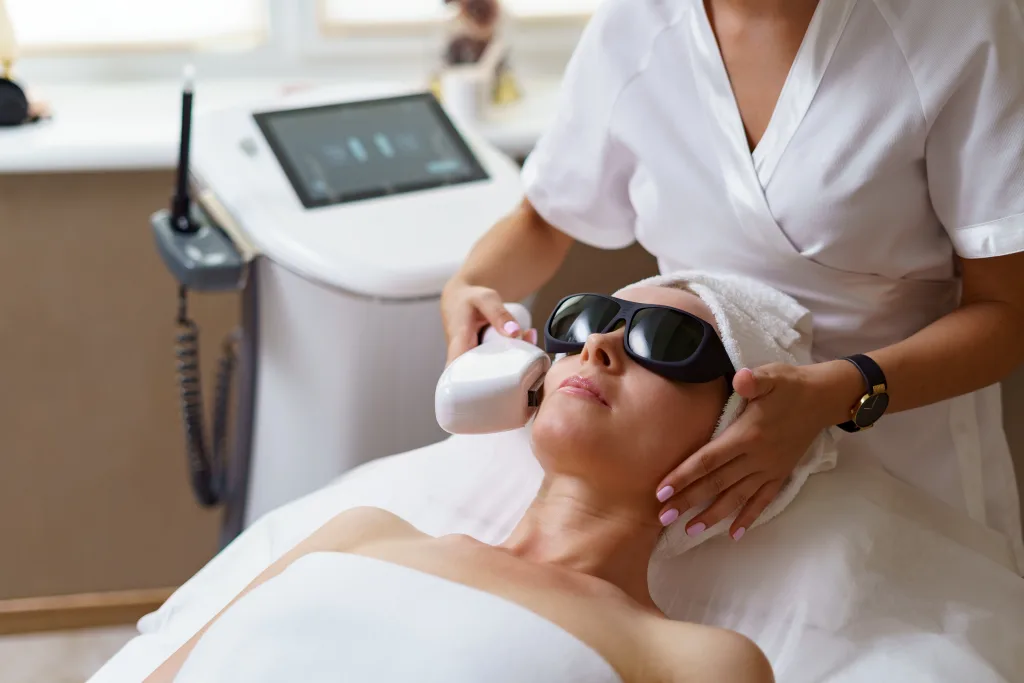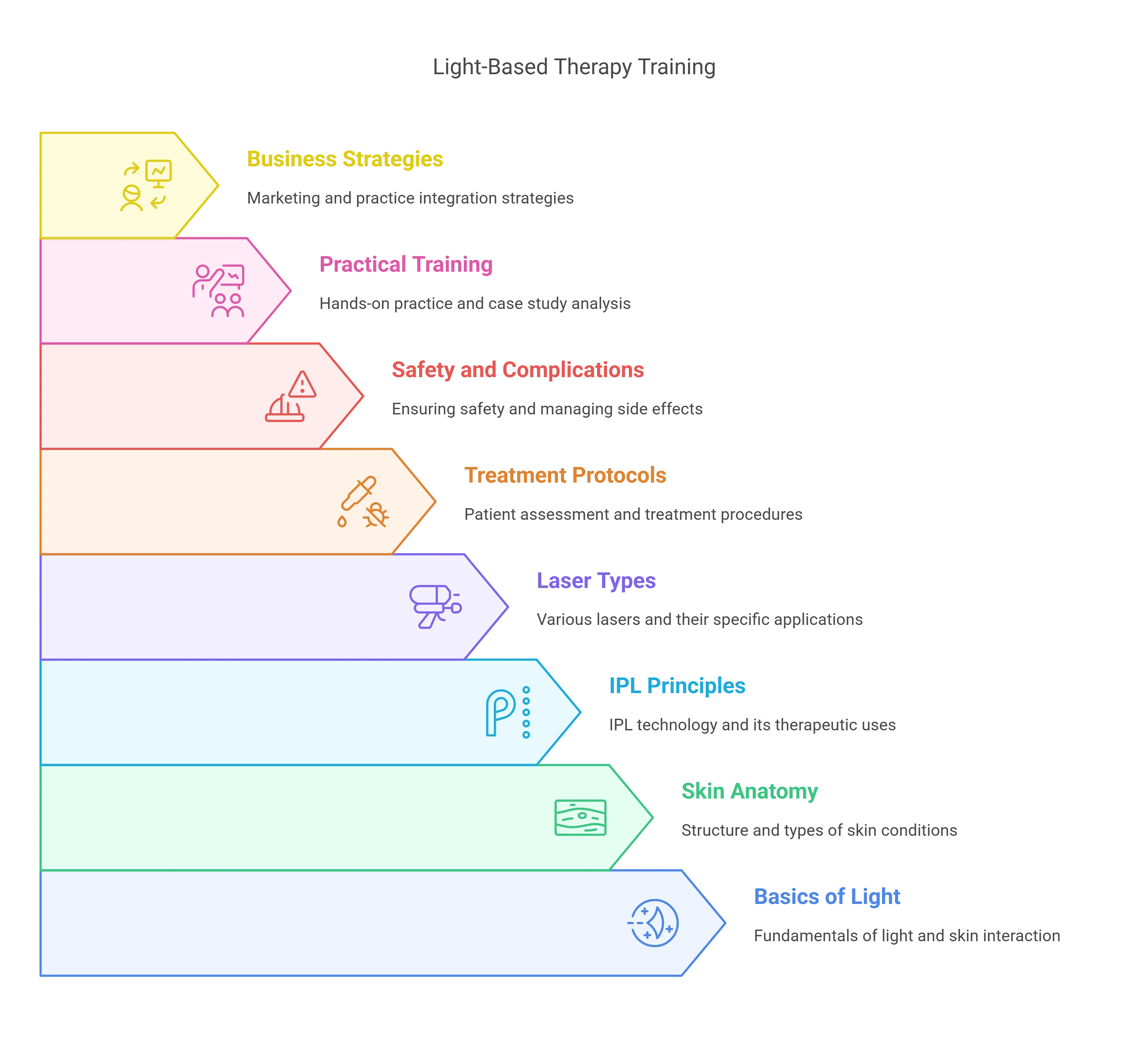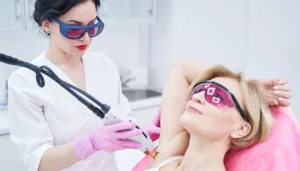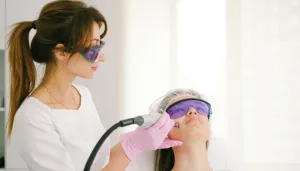
If you’ve ever wondered how professionals achieve flawless skin treatments, reduce unwanted hair, or tackle skin concerns with precision, the answer lies in IPL (Intense Pulsed Light) and Laser technology.
But what exactly do these treatments involve, and how can you learn to perform them?
Let’s break down everything you need to know about IPL and laser technology, the benefits of taking these courses, and the career opportunities that await you after completion.
Key Takeaways
- IPL stands for Intense Pulsed Light, while laser technology uses focused light beams.
- Both technologies are used for skin treatments, but they differ in their methods and applications.
- Completing IPL & Laser courses can lead to new job opportunities in the aesthetics field.
- These courses typically include hands-on training and theoretical knowledge, ensuring a well-rounded education.
- Accredited courses are essential for gaining recognised qualifications in the beauty industry.
Understanding IPL & Laser Technology
What Is IPL?
So, IPL, or Intense Pulsed Light, is basically like a souped-up camera flash. Instead of a single beam of light like a laser, it uses a broad spectrum of light. Think of it as a versatile tool that can target different things in your skin at the same time.
It’s often used for things like reducing redness, fading age spots, and even hair removal. It’s not a laser, but it’s still pretty powerful stuff.
What Is Laser Technology?
Laser technology, on the other hand, is all about precision. Lasers use a single, focused beam of light to target specific things. This makes them really good for things like tattoo removal, getting rid of unwanted hair, and some types of skin resurfacing.
Because the light is so focused, it can be more effective for certain treatments, but it also means you need to be extra careful when using it. It’s like the difference between using a floodlight and a spotlight – both light up a room, but in very different ways.
Differences Between IPL and Laser
Okay, so here’s the deal: IPL and laser treatments both use light to achieve results, but they’re not the same. IPL uses a broad spectrum of light, kind of like a photo flash, while lasers use a single, concentrated beam. This means lasers are generally more precise and can be more effective for certain things, like hair or tattoo removal.
IPL is often better for treating larger areas and multiple skin issues at once, like redness and age spots. It’s also usually less painful and has a lower risk of side effects. Choosing between the two really depends on what you’re trying to achieve and your skin type.
Think of it this way: lasers are like a sniper rifle, targeting one specific thing with great accuracy. IPL is more like a shotgun, covering a wider area and addressing multiple concerns at once. Both have their place, and knowing the difference is key to getting the best results.
Benefits of IPL & Laser Courses
IPL and laser course is not just about zapping away unwanted hair; it’s a real investment in your future. Let’s break down why these courses are actually worth your time and money.
Career Advancement Opportunities
Okay, first things first: career moves. Getting certified in IPL and laser tech can seriously boost your job prospects. Loads of clinics and salons are looking for qualified people, and having that certificate on your CV makes you stand out. Plus, it opens doors to higher-paying positions. Who wouldn’t want that?
Skill Development
It’s not just about getting a piece of paper; you actually learn stuff. These courses teach you the ins and outs of the technology,
- How to safely operate the equipment
- How to tailor treatments to different skin types.
You’ll gain practical skills that you can use every day, making you a more confident and capable practitioner. It’s like levelling up in a video game, but for your career.
Client Satisfaction and Safety
Happy clients are repeat clients, right? By understanding the science behind IPL and laser treatments, you can provide better, safer, and more effective services. This leads to happier customers who trust you and recommend you to their friends. Plus, knowing you’re doing things safely protects both you and your clients. It’s a win-win situation, really.
Taking an IPL and laser course isn’t just about learning a new skill; it’s about investing in your professional growth, increasing your earning potential, and providing top-notch service to your clients. It’s a step towards becoming a true expert in the field of aesthetic treatments.
Course Structure and Content

But what exactly will you learn? Let’s break down what you can expect in terms of course structure and content.
Theoretical Knowledge
First up, the theory. Don’t worry, it’s not all boring textbooks! You’ll cover the science behind IPL and laser technology. This includes understanding how light interacts with skin, different skin types and conditions, and the physics of the machines themselves.
A solid grasp of this theoretical foundation is key to performing safe and effective treatments. You’ll also learn about:
- Laser safety protocols.
- Skin anatomy and physiology.
- Treatment parameters and how to adjust them.
Practical Training
Okay, now for the fun part – getting hands-on! Practical training is where you’ll learn to operate IPL and laser machines under the supervision of experienced instructors. You’ll practise on models (and maybe even each other!) to gain confidence and develop your technique. Expect to cover:
- Machine operation and maintenance.
- Treatment techniques for various skin concerns.
- Client consultation and assessment.
- Emergency procedures.
Assessment and Certification
To wrap things up, you’ll need to demonstrate your knowledge and skills through assessments. This might involve written exams, practical assessments, and case studies. Once you’ve successfully completed the course, you’ll receive a certification that proves you’re competent to perform IPL and laser treatments.
Getting certified isn’t just a piece of paper; it’s proof that you’ve met a certain standard of competence. It shows potential employers (or your future clients) that you know your stuff and can be trusted to deliver safe and effective treatments.
Target Audience for IPL & Laser Courses
So, who exactly signs up for these IPL and laser courses? It’s a pretty diverse bunch, actually. You might be surprised!
Beauty Therapists
Loads of beauty therapists take these courses. They’re often looking to upskill and add more advanced treatments to what they already offer. Think about it: a beauty therapist already knows a lot about skin and client care. Adding laser or IPL is a natural next step. It lets them offer more comprehensive services and attract a wider range of clients.
Medical Professionals
Doctors, nurses, and other medical people are increasingly interested in aesthetic treatments. For them, IPL and laser courses offer a way to expand their skills into a growing area. They bring a strong understanding of anatomy and physiology, which is a great base for learning these technologies. Plus, some medical settings are starting to offer these treatments, so having trained staff is a must.
Aspiring Aesthetic Practitioners
Then there are the people who are completely new to the world of aesthetics. Maybe they’re looking for a career change, or they’re just fascinated by the industry.
These courses give them a solid foundation to start their journey. It’s a chance to learn the ropes, get certified, and begin building a client base. It can be a bit daunting starting from scratch, but with the right training, it’s totally achievable.
Basically, if you’re interested in skin treatments and have a desire to learn, there’s a good chance an IPL or laser course is right for you. It doesn’t matter if you’re already experienced or just starting out; there’s something for everyone.
Accreditation and Recognition
Importance of Accredited Courses
Choosing an accredited IPL or laser course is really important. Accreditation means the course meets certain standards and is recognised by industry bodies. It’s like a quality stamp, showing that the training you receive is up to scratch. Without it, you might find it hard to get insurance or even find a job. It’s worth checking if the course is accredited before you sign up.
Recognised Qualifications
Getting a recognised qualification after your IPL and laser training can seriously boost your career. Think of qualifications like CIBTAC or Ofqual regulated certificates. These aren’t just pieces of paper; they show potential employers that you’ve got the skills and knowledge needed to do the job well.
Plus, some advanced treatments might actually require specific qualifications, so it’s worth thinking about what you want to do in the future when choosing a course.
Industry Standards
Keeping up with industry standards is a must in the ever-changing world of aesthetics. These standards cover everything from safety protocols to the latest treatment techniques. Courses that focus on these standards make sure you’re not just learning the basics, but also staying ahead of the curve. It’s all about giving your clients the best possible care and results, and that means knowing what’s what in the industry.
Staying up-to-date with industry standards isn’t just about following rules; it’s about showing your commitment to providing safe and effective treatments. It builds trust with your clients and helps you stand out in a competitive market.
Advanced Techniques in IPL & Laser Treatments
Customising Treatments
Customisation is where the magic happens. It’s not just about zapping away unwanted hair or smoothing out wrinkles; it’s about understanding each client’s unique skin type, condition, and concerns.
Think of it like this: you wouldn’t give everyone the same prescription for glasses, would you? Same goes for IPL and laser. You need to know your Fitzpatrick skin types, understand how different skin reacts to light, and tailor your approach accordingly. This might mean adjusting the intensity, pulse duration, or even the type of laser used. It’s a bit of trial and error, but that’s where your training really pays off.
Managing Client Expectations
Alright, let’s be real. People come in with all sorts of ideas about what IPL and laser can do. Some think they’ll walk out looking ten years younger after one session. It’s our job to bring them back down to earth. Managing expectations is key to client satisfaction.
Here’s the thing:
- Be honest about what can be achieved.
- Explain the process clearly, including potential side effects.
- Show before-and-after photos of similar cases.
Under-promise and over-deliver. It’s an old saying, but it rings true. If you set realistic expectations from the start, clients are much more likely to be happy with the results, even if they’re not quite as dramatic as they’d hoped.
Safety Protocols
Okay, this is non-negotiable. Safety always comes first. You’re dealing with powerful equipment that can cause serious damage if used incorrectly.
Here’s a quick rundown:
- Always perform a patch test before a full treatment.
- Use the correct eye protection for both you and the client.
- Follow the manufacturer’s instructions for the equipment to the letter.
And remember, if you’re ever unsure about something, don’t be afraid to ask for help. It’s better to be safe than sorry. No one wants to be responsible for a laser-related mishap, trust me.
Career Opportunities After Completion
What’s next? Well, the good news is that a whole bunch of doors are now open to you. The aesthetics industry is booming, and qualified practitioners are in demand. Let’s have a look at some of the paths you could take.
Working in Aesthetic Clinics
One of the most common routes is to join an established aesthetic clinic. Clinics are always on the lookout for skilled therapists who can provide treatments like laser hair removal, skin rejuvenation, and pigmentation correction.
You’ll be working as part of a team, gaining experience, and building a client base. Plus, you’ll likely have access to the latest technology and training opportunities. It’s a great way to get your foot in the door and learn from experienced professionals.
Starting Your Own Practise
Fancy being your own boss? An IPL and laser qualification can be the perfect springboard for starting your own practise. It’s a big step, but it offers huge potential for financial and personal reward.
You’ll need to think about things like business plans, marketing, and finding the right premises, but the freedom to set your own hours and offer the treatments you’re passionate about can be incredibly satisfying.
Expanding Your Service Offerings
Even if you’re already working in the beauty industry, an IPL and laser course can help you expand your service offerings and attract new clients.
Maybe you’re a hairdresser looking to add laser hair removal to your salon, or a massage therapist wanting to offer skin rejuvenation treatments. By upskilling, you can become a one-stop shop for all things beauty, increasing your earning potential and making your business more competitive.
Conclusion
As the beauty and aesthetics industry continues to evolve, IPL and laser treatments are becoming essential skills for professionals looking to expand their expertise. Whether you want to specialize in hair removal, skin rejuvenation, or advanced cosmetic procedures, enrolling in a certified IPL and laser course can open doors to exciting career opportunities.
With the right training, you’ll gain hands-on experience, industry knowledge, and the confidence to deliver safe and effective treatments. So, if you’re passionate about skincare and cutting-edge technology, now is the perfect time to invest in your future and take the next step toward becoming a sought-after aesthetic practitioner.
Frequently Asked Questions
What does IPL stand for?
IPL stands for Intense Pulsed Light, which is a technology used for various skin treatments.
How does laser technology work?
Laser technology uses focused light beams to treat skin issues, such as hair removal and skin rejuvenation.
What is the main difference between IPL and laser?
The main difference is that IPL emits multiple wavelengths of light, while lasers use a single wavelength.
Who can take IPL and laser courses?
These courses are suitable for beauty therapists, medical professionals, and anyone interested in aesthetics.
What can I do after completing an IPL or laser course?
You can work in clinics, start your own practise, or enhance your current services.
Are these courses accredited?
Yes, many IPL and laser courses are accredited, ensuring quality training and recognition in the industry.







